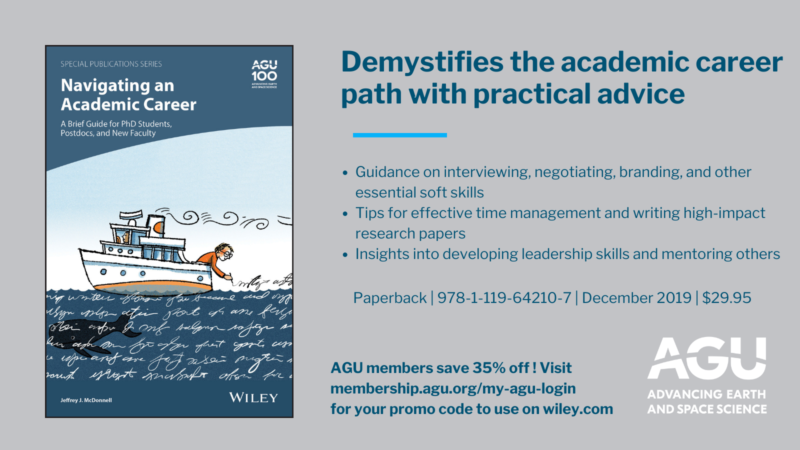October 30, 2020
Navigating an Academic Career: A Brief Guide for PhD Students, Postdocs and Early Career Faculty
Posted by larryohanlon
 Are you thinking about a career in academia, or navigating your way through the demands of your first few years in an academic job? Jeffrey McDonnell, AGU Fellow and Past President of the AGU Hydrology Section, recently pulled together some advice for people on the academic pathway in a short book. We asked him to share a few nuggets of advice from his book.
Are you thinking about a career in academia, or navigating your way through the demands of your first few years in an academic job? Jeffrey McDonnell, AGU Fellow and Past President of the AGU Hydrology Section, recently pulled together some advice for people on the academic pathway in a short book. We asked him to share a few nuggets of advice from his book.
What would you say to a PhD student who is feeling stressed?
I’d say: talk to someone; don’t suffer in silence. A recent survey found that more than 50 percent of PhD students struggled with their mental health during their program. Crises—from mild to major—are commonplace: difficulty writing a chapter; a challenging student colleague or committee member; a thorny relationship with your supervisor; stress linked to the uncertainty of what comes next. What is not common is discussing it. Talk about it with your supervisor, your peers, your friends outside of academia. Realise that stress, worry, and anxiety are very common for PhD students; and that you are not alone.
What are the main attractions of an academic career?
Ah, there are so many! For most of us, the drive to pursue an academic career is the great curiosity and passion for our science. Another common reason is the rejection of the conventional workplace structure. After my master’s program, I spent a year working in the consulting industry, but I hated the structure of organizational rules and found the repetition and narrowness of the scientific tasks boring. I spent a year after my PhD working at NASA, which was thrilling on many levels but, again, I chafed against the bureaucracy and my limited scope to study what I wanted. I simply hate rules. I love freedom. An academic career offers maximum freedom and I’d say that’s the main attraction.
What do you think makes for a successful and happy academic scientist?
Traits for successful scientists have been discussed since the 1600s. Among them are common sense, an inquiring mind, an outsized spirit of perseverance, and some sense of ambition. Many have noted that passion and curiosity are equally, if not more important, than IQ. If I were to encourage my new graduate students to get a tattoo it would be the words from Richard Hamming’s classic essay, You and Your Research: “If you do not work on an important problem, it’s unlikely you’ll do important work”. There’s little value focusing on narrow topics and obscure questions that only you are interested in. And remember that there’s more to life than academia. Achieving a work-life balance can be a challenge but it’s key to ensure that you have other interests, ways to relieve stress, and take time off.
How would you advise people facing a demanding and multi-faceted academic career?
“What is important is seldom urgent and what is urgent is seldom important”. This quote, attributed to US President Dwight Eisenhower, captures academic life in a nutshell. Academic life is best wearing earmuffs (the things we wear here in Canada in winter!) to drown out the white noise of what is coming across your desk and being asked of you, and to filter out the unimportant. It’s daily triage, but with a long-term goal and purpose—keeping your main thing, the main thing.
How can a junior researcher start early with developing leadership skills?
Early-career scientists often think about leadership in a formal sense and at the highest levels—an appointed administrator at a university, an elected leader of a scientific union. But leadership usually starts through small, informal roles, and leadership skills are cultivated over time. Find a senior faculty member willing to be your mentor then ask for opportunities such as speaking engagements to represent the department or university unit, serving on departmental committees to learn about organizational practices, or participating in professional societies as an early career representative. Through a variety of experiences, you will incrementally gain confidence, learn to express ideas publicly, and develop leadership experience.
If you could wind back the clock 30 years, what one thing would you do differently at the start of your academic career?
That’s a tough question! For keeping my main thing, the main thing, I would make my younger self practice what I do now: the one-hour work day. Of course there are many more hours in a working day. But finding a small amount of time each day for writing—the “real” work of academia can pay huge dividends. Distractions abound including teaching classes and doing lab work, being an active member of your department and serving on committees, reviewing papers and preparing conference presentations. But writing does not need long stretches of uninterrupted time as I thought early on. Focus and regularity are what matter. So I recommend adoption of daily writing as an early-career habit and then protection of that short, daily sacrosanct time for the next 30 years!
Navigating an Academic Career: A Brief Guide for PhD Students, Postdocs, and New Faculty, published by AGU, is available via Wiley.com with 35% off using the discount code AGU20.
Jenny Lunn, Director of Publications, American Geophysical Union
Jeffrey McDonnell, Professor of Hydrology, University of Saskatchewan


 On the Job is an AGU blog, that provides career advice and workforce guidance to geoscience students, early-career and established professionals who are interested in pursuing professional enrichment.
On the Job is an AGU blog, that provides career advice and workforce guidance to geoscience students, early-career and established professionals who are interested in pursuing professional enrichment.